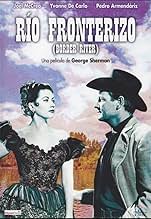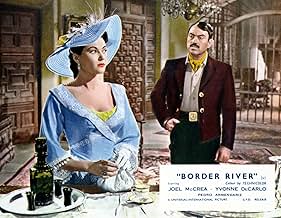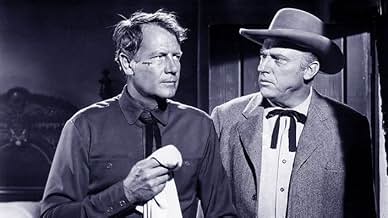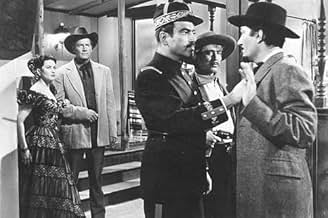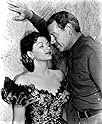Un officier confédéré et ses hommes se rendent au Mexique pour acheter des armes afin de poursuivre l'effort de guerre. Un officier de l'Union décide de les arrêter.Un officier confédéré et ses hommes se rendent au Mexique pour acheter des armes afin de poursuivre l'effort de guerre. Un officier de l'Union décide de les arrêter.Un officier confédéré et ses hommes se rendent au Mexique pour acheter des armes afin de poursuivre l'effort de guerre. Un officier de l'Union décide de les arrêter.
Pedro Armendáriz
- Gen. Calleja
- (as Pedro Armendariz)
Renate Hoy
- Annina Strasser
- (as Erika Nordin)
George D. Wallace
- Fletcher
- (as George Wallace)
Emile Avery
- Mexican Soldier
- (non crédité)
Ray Beltram
- Barfly
- (non crédité)
Histoire
Le saviez-vous
- AnecdotesAccording to Fred H. Detmers, Technicolor's domestic sales manager, in the June-July 1968 issue of "Films in Review," this was the last film shot in the Three-Strip Technicolor process; however, according to a number of other reliable sources, Foxfire (1955) holds that distinction.
- Citations
General Eduardo Calleja: We will give these men a fair trial, then we will shoot them in the morning.
Commentaire à la une
Border River is directed by George Sherman and written by William Sackheim and Louis Stevens. It stars Joel McCrea, Yvonne De Carlo, Pedro Armendariz, Alfonso Bedoya and Howard Petrie. Music is by Joseph Gershenson and cinematography by Irving Glassberg.
During the war between Maximillian and Juarez in 1865, there was a small territory on the Mexican side of the Rio Grande River known as Zona Libre - - - "Free Zone". It was dominated by a man who called himself General Eduardo Calleja and he made it a haven for any man outside of the law. This is the story of Zona Libre.
The above statement that opens the pic is actually a bit of a lie since the film is a story that operates out of Zona Libre. It essentially finds McCrea as a Confederate soldier who has hidden stolen gold bullion in the territory. He then sets about keeping it safe in readiness for the buying of Henry Repeater rifles to aid the Confederacy in keeping the Civil War on going. Naturally there are plenty of folk in Zona Libre interested in finding out where the gold is stashed...
"Never saw a Southern boy yet didn't have a lily sprouting out of his liver"
Utterly frustrating piece of Western genre film making. We have a top draw premise on the page - where a hot bed of a neutral area inhabited by crooks and various Civil War(s) operatives operate - is not brought about for fire cracker ignition. Screenplay is more concerned with putting McCrea's Clete Mattson through the standard formula tropes of protecting gold from others, whilst courting the attention of the local beauty. Even more galling from a wasted opportunity point of view is that this is one of those rare occasions where the film is siding with the Southern protagonist. Any genre fan will tell you that it's nice to have some Civil War balance once in a while...
Annoyance is further enhanced by just how spiffing the tech credits are for this production. Irving Glassberg often came up with quality when asked to be the cinematographer of choice in various Western entries, and so is the case here where he tantalises the eyes as the Utah locales boom in Technicolour. So to with the costuming (Joan Joseff) of De Carlo, who has not only never looked so ravishing in attractiveness prior to 1954, but also with Glassberg's colour lenses her dressage becomes scintillating.
Action only fluctuates, again annoying since Sherman knows how to stage a good action set piece, and when McCrea is your leading man in a Western then you should be making hay while the sun shines. Sadly, great set pieces are in short supply, though McCrea once again proves what a great punch thrower he was. Highlight has to be a sequence where McCrea and his stunt horse land in quicksand (a critical narrative device in fact), the subsequent fight from man and beast to escape is quality - as is McCrea's (a bona fide horseman in real life) response to the equine post the sequence.
In the mix there is Armendariz and Bedoya seemingly in a contest to see who can outdo each other in the over acting stakes, which is actually fun and one of the plus points in the production. Which leaves us with what?. Well as a Western lover I just love many facets of the production on show, so much so I couldn't rate it below average. On the flip side, however, I couldn't remotely recommend it to genre fans in confidence, the proviso being that the writers should have been rounded up and fired upon by the Henry Repeaters in the play. 6/10
During the war between Maximillian and Juarez in 1865, there was a small territory on the Mexican side of the Rio Grande River known as Zona Libre - - - "Free Zone". It was dominated by a man who called himself General Eduardo Calleja and he made it a haven for any man outside of the law. This is the story of Zona Libre.
The above statement that opens the pic is actually a bit of a lie since the film is a story that operates out of Zona Libre. It essentially finds McCrea as a Confederate soldier who has hidden stolen gold bullion in the territory. He then sets about keeping it safe in readiness for the buying of Henry Repeater rifles to aid the Confederacy in keeping the Civil War on going. Naturally there are plenty of folk in Zona Libre interested in finding out where the gold is stashed...
"Never saw a Southern boy yet didn't have a lily sprouting out of his liver"
Utterly frustrating piece of Western genre film making. We have a top draw premise on the page - where a hot bed of a neutral area inhabited by crooks and various Civil War(s) operatives operate - is not brought about for fire cracker ignition. Screenplay is more concerned with putting McCrea's Clete Mattson through the standard formula tropes of protecting gold from others, whilst courting the attention of the local beauty. Even more galling from a wasted opportunity point of view is that this is one of those rare occasions where the film is siding with the Southern protagonist. Any genre fan will tell you that it's nice to have some Civil War balance once in a while...
Annoyance is further enhanced by just how spiffing the tech credits are for this production. Irving Glassberg often came up with quality when asked to be the cinematographer of choice in various Western entries, and so is the case here where he tantalises the eyes as the Utah locales boom in Technicolour. So to with the costuming (Joan Joseff) of De Carlo, who has not only never looked so ravishing in attractiveness prior to 1954, but also with Glassberg's colour lenses her dressage becomes scintillating.
Action only fluctuates, again annoying since Sherman knows how to stage a good action set piece, and when McCrea is your leading man in a Western then you should be making hay while the sun shines. Sadly, great set pieces are in short supply, though McCrea once again proves what a great punch thrower he was. Highlight has to be a sequence where McCrea and his stunt horse land in quicksand (a critical narrative device in fact), the subsequent fight from man and beast to escape is quality - as is McCrea's (a bona fide horseman in real life) response to the equine post the sequence.
In the mix there is Armendariz and Bedoya seemingly in a contest to see who can outdo each other in the over acting stakes, which is actually fun and one of the plus points in the production. Which leaves us with what?. Well as a Western lover I just love many facets of the production on show, so much so I couldn't rate it below average. On the flip side, however, I couldn't remotely recommend it to genre fans in confidence, the proviso being that the writers should have been rounded up and fired upon by the Henry Repeaters in the play. 6/10
- hitchcockthelegend
- 11 juin 2019
- Permalien
Meilleurs choix
Connectez-vous pour évaluer et suivre la liste de favoris afin de recevoir des recommandations personnalisées
- How long is Border River?Alimenté par Alexa
Détails
- Durée1 heure 20 minutes
- Rapport de forme
- 1.37 : 1
Contribuer à cette page
Suggérer une modification ou ajouter du contenu manquant

Lacune principale
By what name was Les rebelles (1954) officially released in India in English?
Répondre
